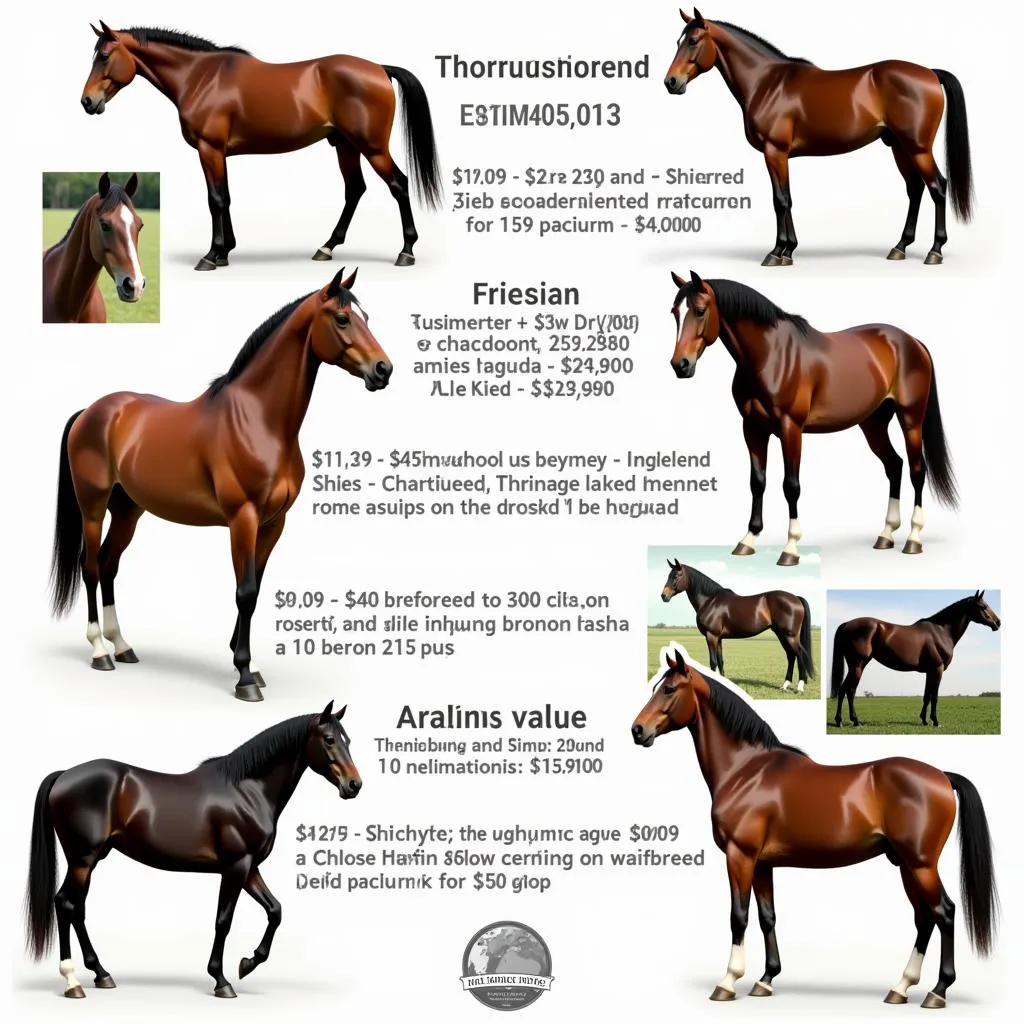The intriguing search term “Nathan Lee Chasing His Horse Net Worth” seems to suggest a quest for information about someone named Nathan Lee and the value of his horse. While specifics about Nathan Lee and his equine companion remain elusive, this article dives deep into the factors influencing horse valuations, the potential wealth associated with horse ownership, and the intricacies of equestrian life.
Deciphering the Value of a Horse
A horse’s worth isn’t determined by a one-size-fits-all formula. Numerous factors contribute to their monetary value, turning each horse’s price tag into a unique equation.
Breed: Pedigree and Prestige
Just like designer labels in the fashion world, certain horse breeds command a premium due to their lineage, athletic prowess, or even temperament. Thoroughbreds, renowned for their speed and dominance in horse racing, often fetch exorbitant prices. Other sought-after breeds like Friesians, known for their striking black coats and elegant gaits, also occupy a higher price bracket.
Training and Performance: Skills That Shine
A well-trained horse, especially one with a proven track record in competitions or specific disciplines, can significantly increase its value. Olympic-level show jumpers, for instance, are incredibly valuable due to their exceptional training and competitive edge.
Age and Health: Factors of Prime Importance
A horse’s age plays a pivotal role in determining its worth. Horses in their prime, typically between 5 and 15 years old, depending on the breed, are generally the most valuable. Health conditions, soundness, and overall fitness also significantly influence a horse’s price.
 Horse Breeds and Their Values
Horse Breeds and Their Values
Beyond the Price Tag: The True Worth of Horse Ownership
While the monetary value of a horse is quantifiable, the true worth of owning a horse extends far beyond dollars and cents.
Companionship and Trust: An Unbreakable Bond
Horses form deep connections with their humans, offering companionship, trust, and unwavering loyalty. The bond between horse and rider transcends mere ownership; it’s a partnership built on mutual respect and understanding.
Physical and Mental Well-being: A Holistic Approach
Horseback riding and caring for horses provide numerous physical and mental benefits. The physical activity involved in riding improves cardiovascular health, balance, and coordination. Moreover, interacting with horses can be therapeutic, reducing stress and promoting emotional well-being.
A World of Opportunities: Exploring Equestrian Pursuits
Horse ownership opens doors to a vibrant world of equestrian activities. From casual trail rides through scenic landscapes to competitive dressage events, the possibilities are as vast as the open fields horses roam.
Nathan Lee and His Horse: Unveiling the Mystery
While concrete details about Nathan Lee and his horse remain unknown, the search term itself sparks curiosity. Perhaps Nathan Lee is an equestrian enthusiast, a horse breeder, or simply someone who cherishes the bond with their equine companion. Regardless of who Nathan Lee is, his quest, as suggested by the search term, mirrors the universal human desire to understand and appreciate the value of things, both tangible and intangible.
 The Unbreakable Bond Between Horse and Rider
The Unbreakable Bond Between Horse and Rider
Conclusion
The value of a horse, much like any cherished companion, extends beyond monetary worth. While factors like breed, training, and health contribute to a horse’s price tag, the true wealth lies in the companionship, personal growth, and unique experiences they offer. Whether Nathan Lee is a seasoned equestrian or a novice horse enthusiast, his journey, like that of many horse lovers, highlights the profound impact these magnificent creatures have on our lives.
FAQs
1. How much does a horse typically cost?
Horse prices vary widely, ranging from a few hundred dollars for a companion horse to millions for top-tier racing or show horses.
2. Are certain horse breeds more expensive to care for?
Some breeds may have specific care requirements or be prone to certain health conditions that could increase overall expenses.
3. What factors affect a horse’s resale value?
Breed, age, training, health, temperament, and competition history all contribute to a horse’s resale value.
4. Can you put a price on the bond between a horse and rider?
The bond between horse and rider is priceless, built on trust, respect, and shared experiences.
5. Where can I learn more about horse care and equestrian activities?
For all your horse-related inquiries and to explore the world of equestrian pursuits, contact Justus Horses USA at Phone Number: 0772127271, Email: [email protected] Or visit us at: QGM2+WX2, Vị Trung, Vị Thuỷ, Hậu Giang, Việt Nam. Our dedicated customer support team is available 24/7 to assist you.